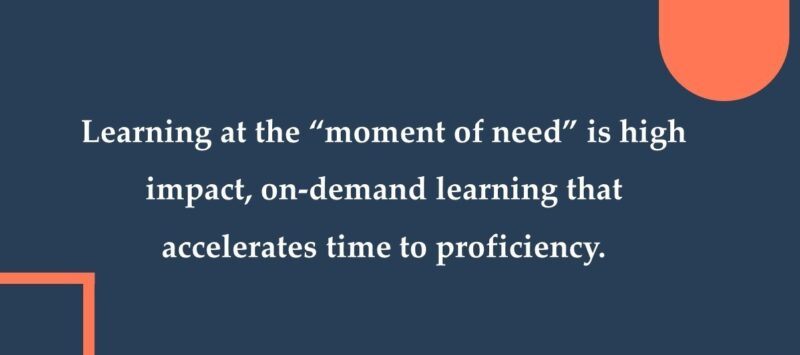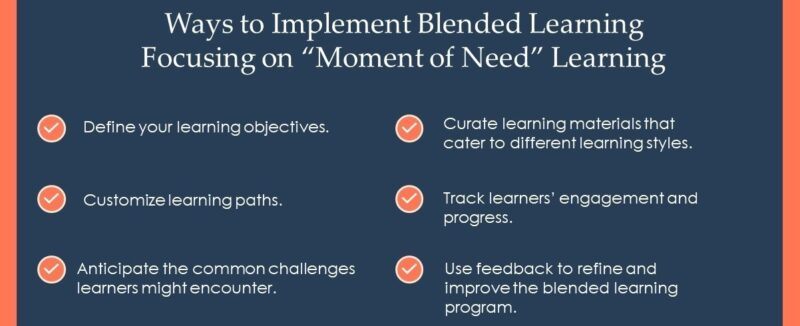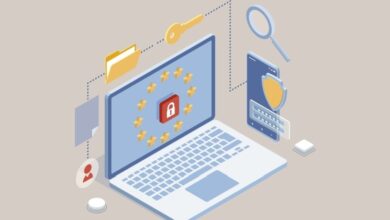Moment-Of-Need Learning For Effective Blended Learning

Blended Learning With Moment-Of-Need Strategies
Moment-of-need learning is a strategic approach that recognizes learning as an ongoing process tailored to address immediate challenges. This paradigm shift emphasizes improving proficiency by leveraging learners’ strengths and refining weaknesses precisely when needed. By focusing on moment-of-need learning, training is accessible just in time, enabling individuals to acquire knowledge at the moment they require it and in the context most relevant to their work.

CommLab India
The concept of the “moment of need” represents a unique opportunity to enhance performance and empower learners. When learners encounter a moment of need, it often signifies a real-world situation where they must apply what they’ve learned in a practical context.
This is the time to reinforce strengths, allow learners to excel, and address weaknesses, providing tailored support for improvement. It’s about aligning training content with the actual demands of the job, bridging the gap between learning and application.
Leveraging Moment-Of-Need Learning For Blended Learning
Similarly, in the realm of blended learning, moment-of-need learning recognizes that learning is most effective when it directly aligns with the immediate challenges faced by learners. By integrating targeted modules within the broader blended learning framework, organizations can ensure that employees access relevant information exactly when required, fostering a culture of continuous improvement.
This tailored and agile learning approach promotes not only skill development but also knowledge application in real-world scenarios. Learners benefit from on-the-spot support. The result is a responsive learning environment that optimizes training time, boosts engagement, and empowers individuals to take charge of their learning journey.

CommLab India
Moment-of-need learning in blended learning is a chance to increase competence, focus on learners’ strengths, and address their issues, when they need it, where they need it, and just in time. This model has truly become a catalyst for growth and performance improvement in blended learning. Let’s discover how.
Providing Information When They Need It
The concept of “when they need it” revolves around delivering learning resources precisely when learners require them. Unlike traditional learning models that follow a predetermined schedule, the blended learning approach adapts to the learner’s real-time needs and challenges. In a blended learning environment, this could mean seamlessly integrating on-the-job support, quick reference materials, or targeted microlearning modules into the overall training program.
It acknowledges that learning is not confined to a specific physical location or a designated training environment. Instead, it adapts to the dispersed nature of modern work, making learning resources accessible across various work settings. This might involve providing mobile-friendly content or leveraging cloud-based platforms, allowing learners to access training materials anywhere. Whether in the office, during remote work, or even on the go, learners can seamlessly tap into relevant resources when they require support.
Watch this video on how blended learning helps cultivate a learning culture.
Providing Information Where They Need It
Blended learning offers a revolutionary approach to training by combining face-to-face Instructor-Led Training sessions with online training programs, significantly reducing the time required to complete training. Blended learning is also significantly beneficial when various stakeholders and learners need to collaborate, providing a flexible and effective solution for diverse learning needs. Additionally, it proves invaluable for enrolling learners in remote locations and fostering inclusion through various opportunities to learn.
Moreover, blended learning becomes indispensable when there’s a need for regular training, as the fusion of traditional and online elements ensures consistent and accessible training. In the long term, it allows individuals to create a sustainable career strategy, offering the freedom to learn at their own pace and integrate learning seamlessly into their professional journeys.
Providing Information Just In Time
The concept of “just in time” in blended learning revolves around delivering targeted information when learners require it for immediate application. It acknowledges that learners often encounter certain challenges or questions during their work, and providing relevant knowledge at that very moment is necessary.
In a blended learning setting, this could involve incorporating quick reference guides, mobile applications, microlearning modules, etc., that focus on certain tasks or issues employees may encounter in their jobs. With a just-in-time approach to blended learning, learners receive timely support and guidance, empowering them to overcome challenges swiftly and fostering a more agile and responsive learning environment.
Benefits Of Moment-Of-Need Learning In Blended Learning
Alignment With Learning Objectives
The design of the blended learning program should ensure that all learning materials, whether delivered in person or online, directly contribute to the intended learning outcomes. This alignment helps learners perceive the value and applicability of the content, providing motivation to learn. By maintaining content relevance and consistency with learning objectives, blended learning not only guides learners toward their goals but also provides a holistic and effective training experience, ultimately benefiting both the individuals and the organization.
Tailored Learning Experiences
Blended learning offers a dynamic approach to addressing immediate challenges through tailored learning experiences. With moment-of-need learning, learners can access relevant content and resources through digital platforms, addressing the specific challenges they face in real time. This personalization in learning delivers support to learners precisely when they require it, making blended learning an effective solution for immediate problem solving and skill enhancement.
Increased Relevance And Retention
Blended learning excels at increasing the relevance and retention of knowledge by emphasizing practical application. This approach combines traditional classroom instruction with digital learning tools, allowing learners to immediately apply what they’ve learned to real-world scenarios. By closing the divide between theory and practice, blended learning enhances learning, resulting in higher engagement and better retention rates.
Continuous Learning
Blended learning is a robust approach that supports continuous learning by adapting to individual schedules. It recognizes that learners have various commitments and time constraints, allowing them to access content at their own pace. This adaptability is particularly valuable in corporate settings where employees may have varying work hours and responsibilities. Blended learning provides the ease to adjust these differences, ensuring that corporate learning is accessible when and where learners need it without disrupting their work routines.
Learner Preferences And Accessibility To Various Devices
Blended learning takes into account learner preferences and the accessibility of devices. Some may have access to smartphones, while others prefer using desktop computers. Blended learning offers a variety of content formats, such as text-based modules, videos, and interactive simulations, making it adaptable to different devices. This flexibility ensures that learners can access training materials in the way that suits them best, whether it’s through a mobile app during a commute or on a desktop computer during work hours.
To Wrap Up
In the dynamic landscape of corporate training, moment-of-need learning within blended learning stands strong for enabling adaptability and efficiency. It’s a powerful force, enabling organizations to nurture proficiency, enhance strengths, and provide targeted support in real time to meet the unique learning demands of the moment, creating a powerful synergy between learners and their evolving learning needs.
Additional Resources:

CommLab India Rapid eLearning Solutions
Working with multiple outsourcing vendors can be stressful, and a waste of time & money. With CommLab India Rapid eLearning Solutions, all your online training needs are taken care of, rapidly and economically.
Source link



